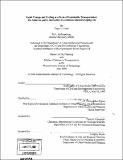| dc.contributor.advisor | P. Christopher Zegras. | en_US |
| dc.contributor.author | Teich, Tegin L. (Tegin Leigh) | en_US |
| dc.contributor.other | Massachusetts Institute of Technology. Dept. of Civil and Environmental Engineering. | en_US |
| dc.coverage.spatial | n-mx--- | en_US |
| dc.date.accessioned | 2009-01-30T16:38:07Z | |
| dc.date.available | 2009-01-30T16:38:07Z | |
| dc.date.copyright | 2008 | en_US |
| dc.date.issued | 2008 | en_US |
| dc.identifier.uri | http://hdl.handle.net/1721.1/44369 | |
| dc.description | Thesis (M.C.P.)--Massachusetts Institute of Technology, Dept. of Urban Studies and Planning; and, (S.M. in Transportation)--Massachusetts Institute of Technology, Dept. of Civil and Environmental Engineering, 2008. | en_US |
| dc.description | Includes bibliographical references (p. 163-170). | en_US |
| dc.description.abstract | In developing countries, growth frequently parallels increasing motorization rates, and visions of mobility are often centered on the private automobile as the most flexible form of personal transportation and a symbol of increasing wealth. The pursuit of mobility in this form has severe social, environmental, and economic consequences, some of which can be mitigated by the promotion of alternative modes of transportation Cycling and other forms of human-powered transportation have benign environmental effects, improve physical health, and can positively affect the psychology of people who, by choosing this mode, are more active and spend time outside and engaged in their environment. Given these benefits, it not surprising that some medium-sized, developing cities are including cycling in their transportation plans.These cities experience significant barriers, however, in promoting cycling as a form of sustainable transportation. Much of the challenge involves effectively utilizing planning processes and tools, which are often imported and applied in a context where they were not designed to be used, to elicit more sustainable transportation behavior in the midst of rapid change. Solutions that come from these planning processes and tools (particularly infrastructure and other engineering- focused solutions) can be ineffective in promoting an alternative form of transportation.Addressing these shortcomings to elicit a change in behavior toward cycling as a form of sustainable transportation requires a new combination of planning tools and processes that can produce effective solutions. | en_US |
| dc.description.abstract | (cont.) In this thesis, I propose a three-step approach to induce behavioral change toward cycling, including: gaining an understanding of the barriers to bicycle use through attitude and perception analysis, improving the planning process through a visioning and backcasting exercise, and assessing and selecting the most appropriate modeling tools for the short-term and long-term promotion of cycling. I apply this approach using a single case study: Chihuahua, Mexico. Although I am unable to show a change in behavior in Chihuahua, initial results indicate that this adjusted approach does have promise in terms of inducing more behavior associated with sustainable transportation practices. | en_US |
| dc.description.statementofresponsibility | by Tegin L. Teich. | en_US |
| dc.format.extent | 198 p. | en_US |
| dc.language.iso | eng | en_US |
| dc.publisher | Massachusetts Institute of Technology | en_US |
| dc.rights | M.I.T. theses are protected by
copyright. They may be viewed from this source for any purpose, but
reproduction or distribution in any format is prohibited without written
permission. See provided URL for inquiries about permission. | en_US |
| dc.rights.uri | http://dspace.mit.edu/handle/1721.1/7582 | en_US |
| dc.subject | Urban Studies and Planning. | en_US |
| dc.subject | Civil and Environmental Engineering. | en_US |
| dc.title | Social change and cycling as a form of sustainable transportation : the behavior-policy interaction in a medium-sized developing city | en_US |
| dc.type | Thesis | en_US |
| dc.description.degree | S.M.in Transportation | en_US |
| dc.description.degree | M.C.P. | en_US |
| dc.contributor.department | Massachusetts Institute of Technology. Department of Civil and Environmental Engineering | |
| dc.contributor.department | Massachusetts Institute of Technology. Department of Urban Studies and Planning | |
| dc.identifier.oclc | 276937811 | en_US |
